RWC 2023 ANALYSIS
The RasNaber Springbok era was defined by many things, but above all else it was defined by courage
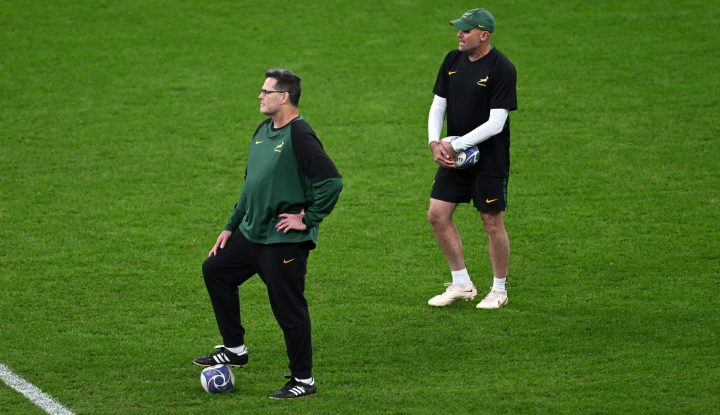
I’ve been thinking deeply about Rassie Erasmus and Jacques Nienaber and what they have achieved and how they have achieved it. Back-to-back Rugby World Cup titles and the fulfilment of a six-year plan focused on winning RWC 2023 didn’t come down to chance.
Yes, they may have had some luck along the way, but that’s sport. Winning one game by a point could be lucky. Winning three in consecutive weekends in the knockout stages at Rugby World Cup (RWC) 2023 by a combined three points, was not. It came down to minuscule edges honed during six years of refinement.
Those tight victories over France, England and the All Blacks in Saint-Denis were the result of an unbreakable, never-give-in attitude developed over six years and executed by the right players.
That mindset was not moulded through winning all the time, it was shaped by defeats and setbacks on the road to Paris. Those losses were never wasted because they were used as lessons, which developed character and resilience.
RasNaber were the first genuinely collective coaching unit at the highest level of rugby. But what made them great?
There are the obvious answers: their own close friendship and unique partnership, in which Erasmus is the de facto leader while Nienaber is the sage chief of staff, provide clarity and harmony.
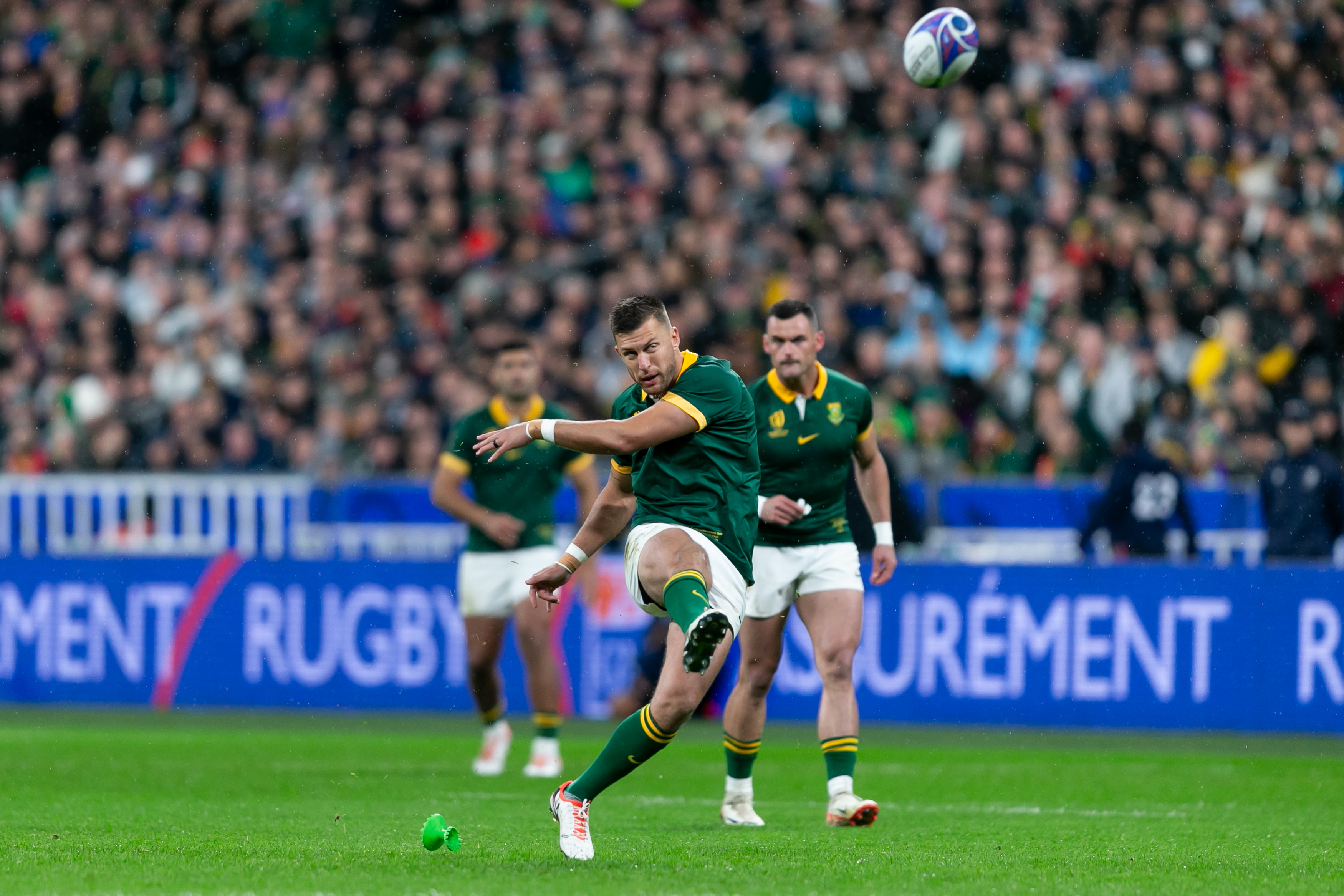
Handré Pollard in action during the World Cup final against New Zealand at Stade de France on 28 October 2023. (Photo: Juan Jose Gasparini / Gallo Images)
Aspects such as hard work, technical nous, research, empathy, psychological understanding of their players, detail, perfectionism and many other traits also made them successful.
But after lots of thought, years of following their journey professionally and hours of speaking to them and people close to them both formally and informally, it all boils down to one word.
Courage.
More than vision and more than hope, they had courage. The courage to fail in the short term and the courage to approach the Springbok coaching job with a new vision.
Their courage had to be complemented by the trust of the SA Rugby hierarchy, from president Mark Alexander and CEOs Jurie Roux and Rian Oberholzer, to the board, MyPlayers (the players’ union) and all the country’s top provinces.
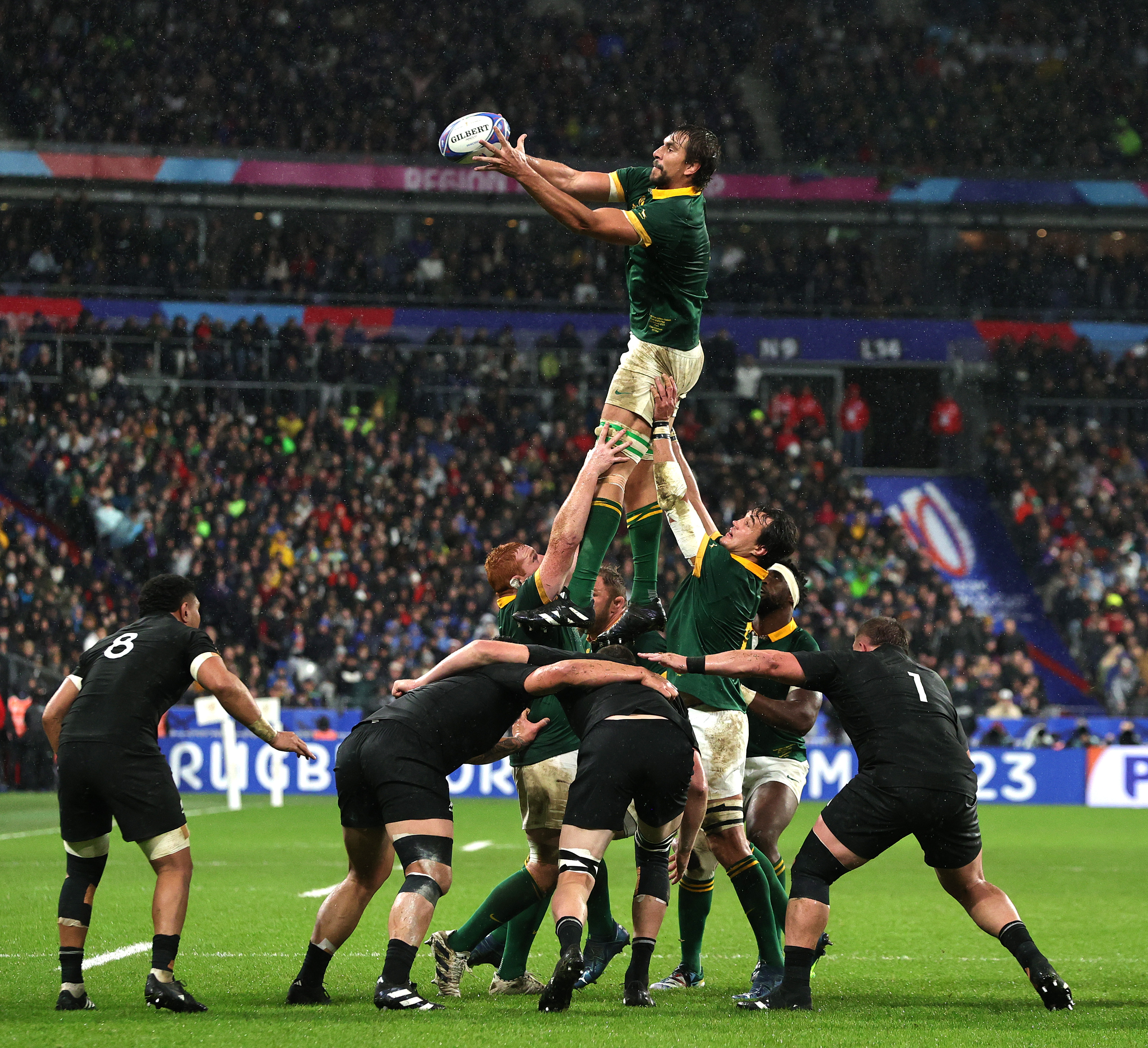
Eben Etzebeth secures the ball in a lineout against the All Blacks during the World Cup final at Stade de France on 28 October 2023. (Photo: David Rogers / Getty Images)
Process over outcome
RasNaber never feared losing. They never feared approaching the sport, but more specifically the job of leading the Springboks, differently. They did fear complacency, entitlement and failure to learn.
In a business that is supposed to be results driven, they were not in it for results’ sake. The outcome was not always the primary goal because they understood that if they perfected the process, results would follow.
Of course, in the Rugby World Cup playoffs only the result mattered. But by the time they reached that point, they had nurtured the team to a place where their earlier courage that ended in a few defeats, ensured that when it mattered, the result took care of itself.
To RasNaber, losing was acceptable as long as it had a purpose. They were not scared to lose, if they gleaned important lessons from those losses and answered certain questions.
Winning was not everything on this six-year journey. So many coaches have gone mad in the agonising pursuit of winning for winning’s sake; of coaching to save their jobs from week to week. Winning at all costs, usually comes at great cost.
If RasNaber could have won every match and been successful at two Rugby World Cups, they would have done it. They are not magicians, however. Pragmatically, to achieve what they achieved in France required sacrifice and the courage to stand up for their convictions in a country that places huge, monstrous emphasis on the Springboks winning.
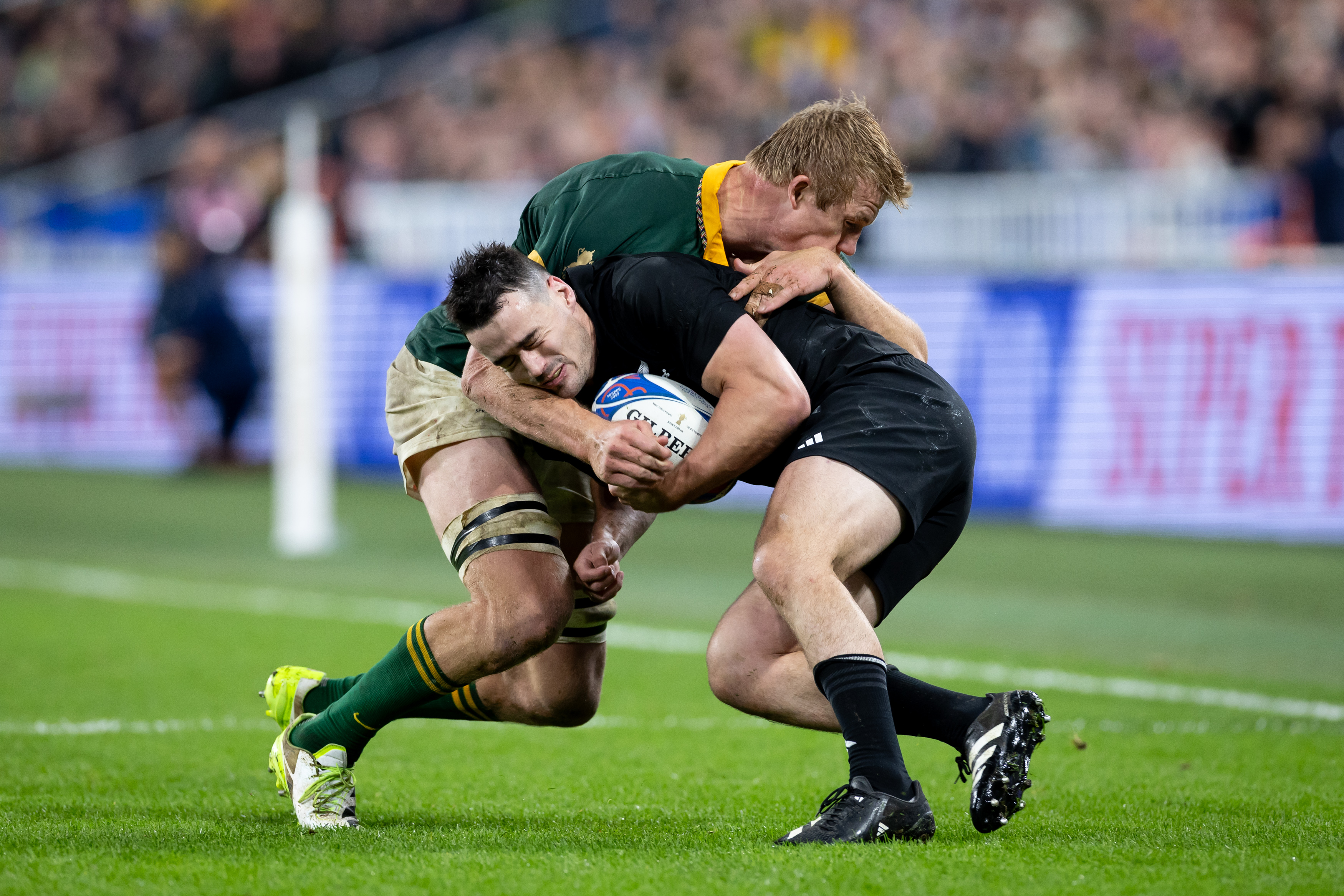
Will Jordan of New Zealand is tackled by Pieter-Steph du Toit of South Africa during the World Cup final at Stade de France on 28 October 2023. (Photo: Gaspafotos / MB Media / Getty Images)
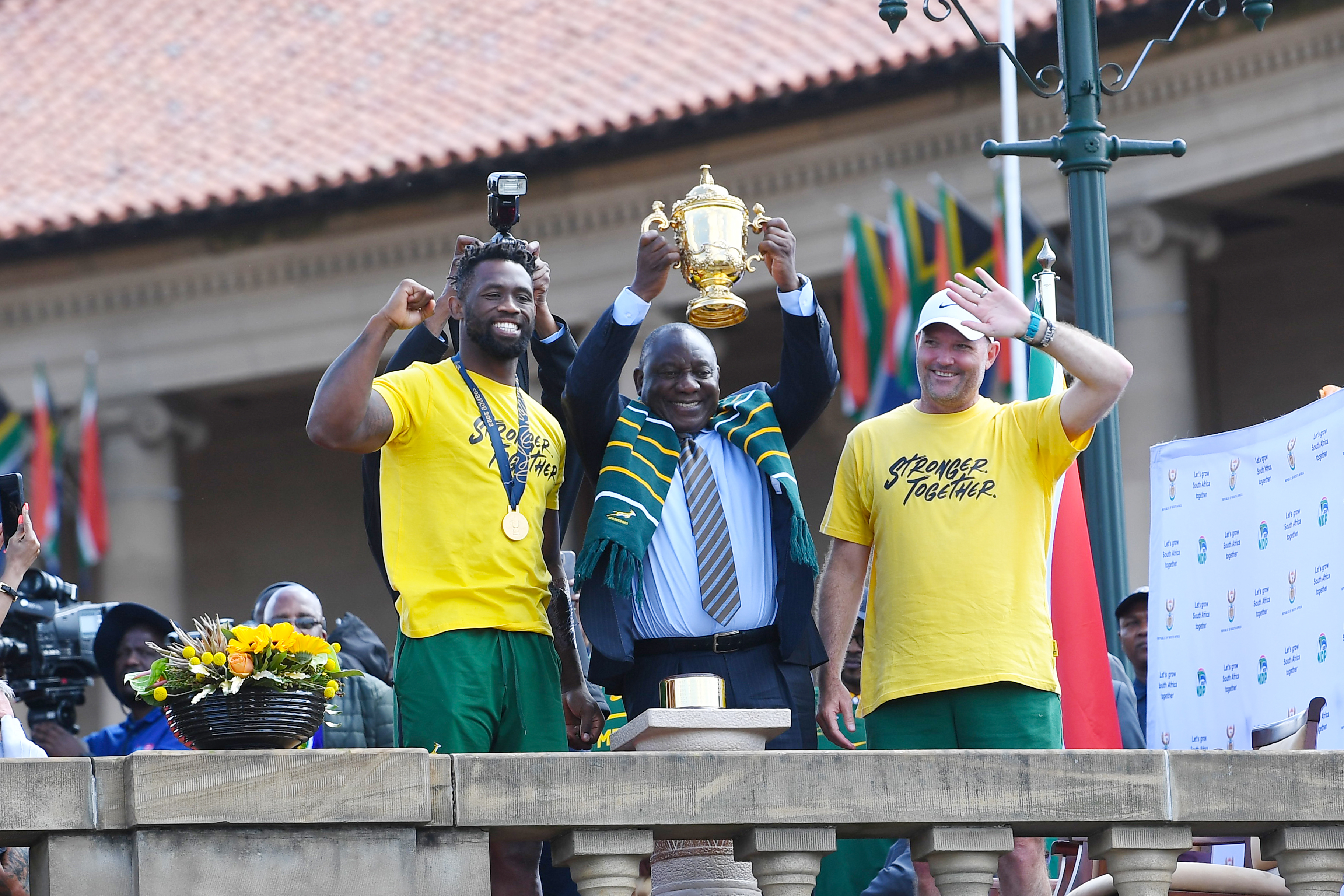
Siya Kolisi, President Cyril Ramaphosa and Jacques Nienaber lift the Webb Ellis Cup on the Springboks’ World Cup trophy tour at the Union Buildings in Pretoria on 2 November 2023. (Photo: Lefty Shivambu / Gallo Images)
Winning when it matters
When RasNaber (I don’t know which one of them it was) famously coined the phrase, “let the main thing be the main thing”, we assumed it referred to winning. But actually, it was much broader than that.
The main thing, it turned out, was winning, but winning when it really mattered. And boy, did they get that right.
Losing RWC Pool matches in 2019 and 2023 were not crises, as long as they grew from those experiences.
Handing 13 new caps in their first Test in charge, against Wales in Washington in June 2018, was an early chance to quickly sort out players who could cope and those who couldn’t.
The Boks lost the Test, but of those 13 new caps, Ox Nché, Makazole Mapimpi, Kwagga Smith, Marvin Orie and Thomas du Toit did alright.
Four years later, against Wales again, this time in Bloemfontein, they made 18 changes to the team for the second Test after winning the first 32-29 at Loftus. The callow team lost South Africa’s first home Test to Wales, going down 13-12 and we all groaned.
Read more in Daily Maverick: Rugby World Cup 2023 News Hub
However, Kurt-Lee Arendse, Deon Fourie and Grant Williams made their Test debuts that day. Two of them were massively influential in beating the All Blacks 12-11 at Stade de France last weekend.
To RasNaber, losing was acceptable as long as it had a purpose. They were not scared to lose, if they gleaned important lessons from those losses and answered certain questions.
They needed to know that when they reached France, they had a squad of 36-40 players who were virtually interchangeable, which would be able to function seamlessly through injuries and a demanding schedule. Essentially, if player A was out, player B had to be as good, and player C too.
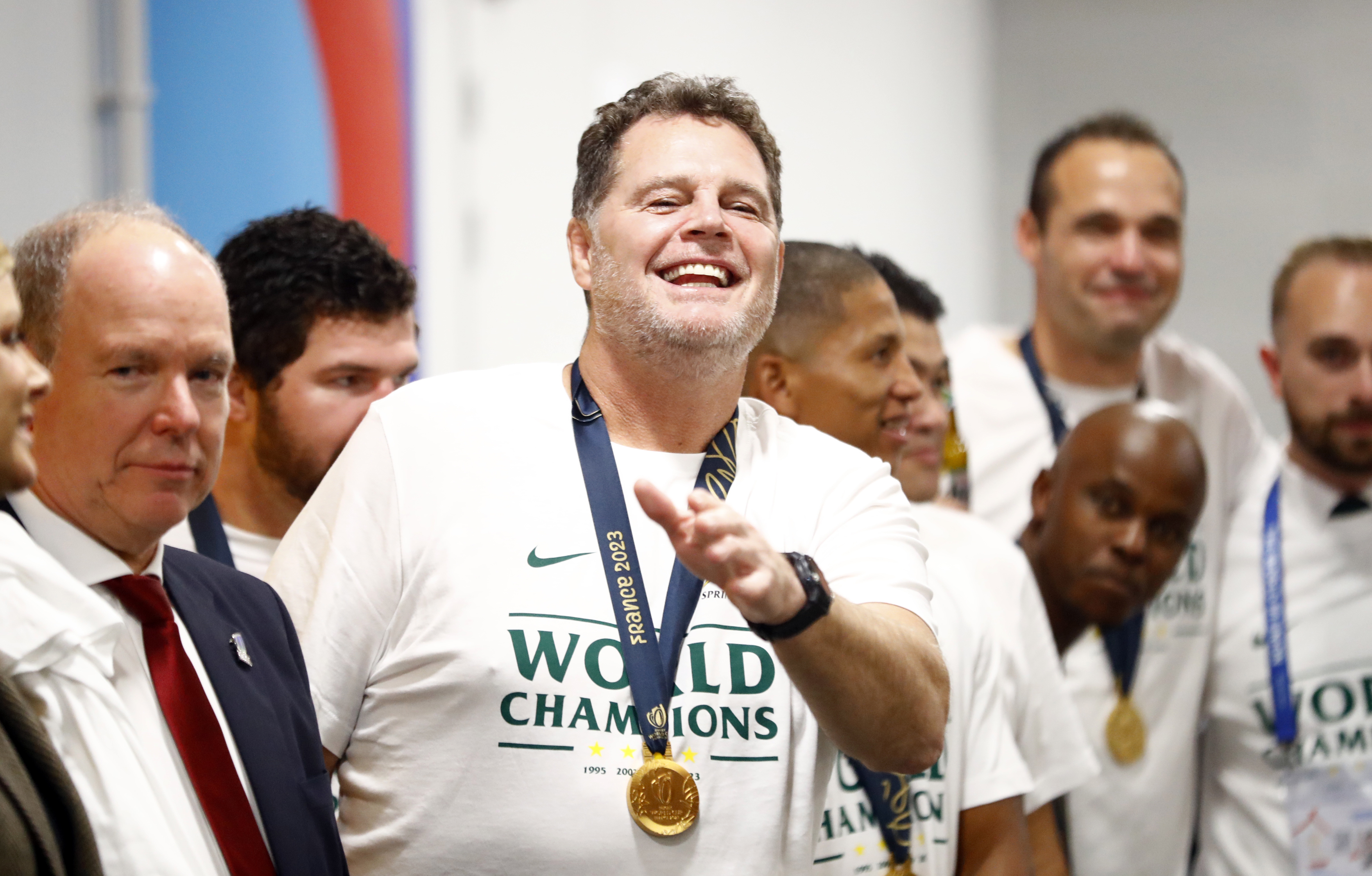
Rassie Erasmus at the World Cup final match between New Zealand and South Africa at Stade de France on 28 October 2023. (Photo: Steve Haag / Gallo Images)
Big calls
That is what they achieved and that is why they won RWC 2o23, having to play against the world’s top five teams along the way. The Mariana Trench depth of the squad was only obtained through courage in trusting a plan and seeing it through, regardless of the shrapnel which inevitably came at times.
In 2022, after thumping the All Blacks 26-10 at Mbombela, RasNaber left hooker Malcolm Marx out of the starting line-up for the return match at Ellis Park seven days later. Marx had been colossal in that victory, but the coaches needed to throw Joseph Dweba into a pressure-cooker situation, and he was chosen to start at Ellis Park.
So too was No 8 Duane Vermeulen, after a three-month injury layoff, despite the fact that Jasper Wiese had just produced his best Bok outing in Mbombela.
The indefatigable spirit, the willingness to get up and make another tackle, or to chase one more ‘lost cause’ as Nienaber said, is what sets them apart. It’s all underpinned by courage.
The temptation must have been to go with what worked and beat the All Blacks again. As it turned out both Dweba and Vermeulen struggled in the first half at Ellis Park and the All Blacks took a 15-0 lead and ultimately victory.
Blaming the entire defeat on two players is perhaps unfair, but as RWC 2023 showed, Test match rugby is defined by small margins. For varying reasons Dweba and Vermeulen struggled that day and the rest of the team was under pressure as a consequence.
The result was not what RasNaber wanted. But the information they gathered was priceless. Dweba was given another start against Australia a few weeks later. The Boks lost again.
It does not mean that Dweba was the only reason for those losses, but the fact that he played just 2o minutes in the next 21 Tests indicates that RasNaber learnt what they needed to from that experience.
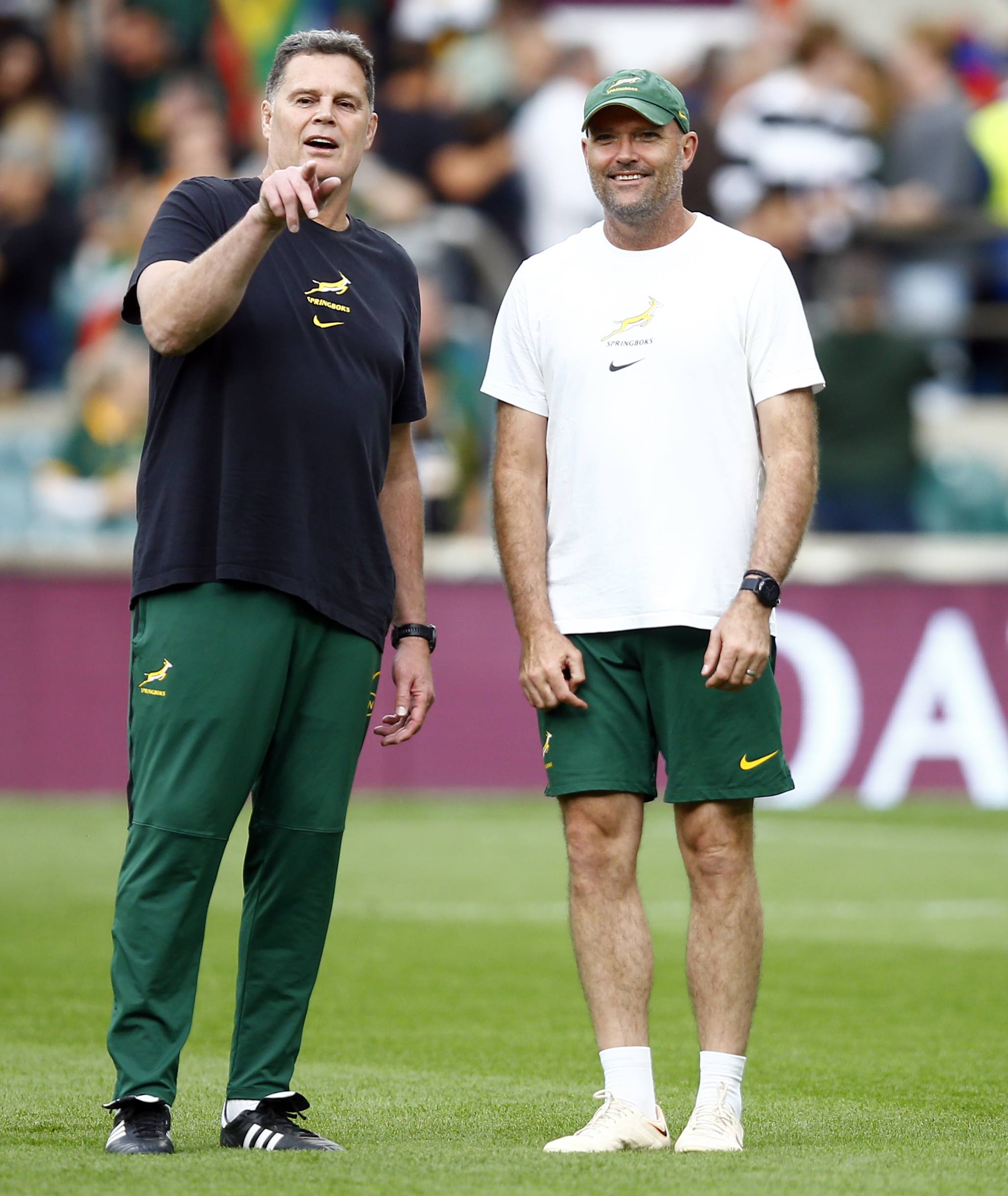
Rassie Erasmus and Jacques Nienaber before the World Cup warm-up match between New Zealand and South Africa at Twickenham in London on 25 August 2023. (Photo: Steve Haag / Gallo Images)
If you stop to think why Dweba wasn’t called up to RWC 2023 when Marx was ruled out of the tournament in week two, and instead RasNaber recalled Handré Pollard and backed 37-year-old flank/hooker Fourie in the front row, it was almost certainly down to what they saw and learnt in the white-hot heat of a Test against the All Blacks at Ellis Park.
The approach has been evident in team selections, tactics and in the way the team played. The indefatigable spirit, the willingness to get up and make another tackle, or to chase one more “lost cause” as Nienaber said, is what sets them apart. It’s all underpinned by courage.
It was the courage to put seven forwards on the bench, or make a substitution after 31 minutes.
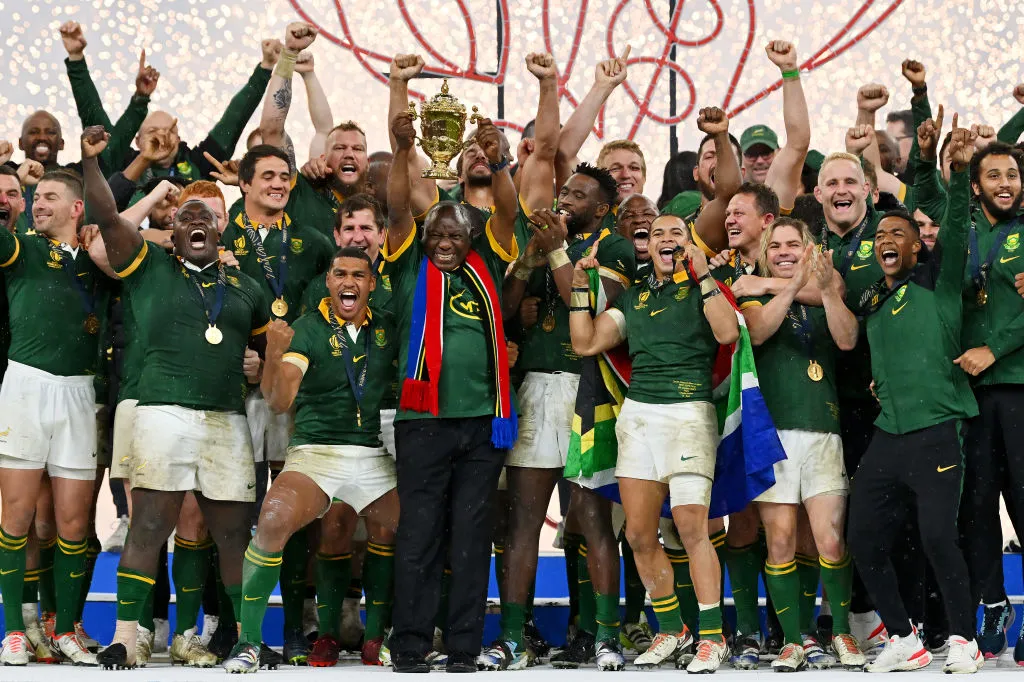
President Cyril Ramaphosa lifts the Webb Ellis Cup with captain Siya Kolisi and his Springbok team after their World Cup victory over New Zealand at Stade de France in Paris on 28 October 2023. (Photo: Dan Mullan / Getty Images)
It was the courage to make Siya Kolisi captain and allow him to blossom into the sport’s most respected figure. That decision emerged from the courage to see transformation as an opportunity, and not a burden.
It was the courage to extend an olive branch to referees after accepting that publicly humiliating them had been a mistake. It was the courage to learn and evolve while having a clear plan and vision.
The courage to be different and the courage to embrace differences.
It was the courage to be unpopular, the courage to fight for a lost cause and ultimately, the courage to win the war after losing a few battles by staying true to their plan.
Courage, above all else, defined the RasNaber era. DM



















 Become an Insider
Become an Insider
I’ve said it once (well OK probably at least 20 times) and I’ll say it many many more times that I think Rassie particularly will go down as one of, or even the, best player/coach/administrator EVER. And of course his team, especially Jacques.
The RWC is the pinnacle of rugby. Why? Because it removes most of the home ground advantages experienced in home and away games plus, as importantly, the traveling and even more so the jetlag. It also means that the players bond together at an even higher level. It is the de facto test of who the best team is in the world. And, no matter what the whinging ABs try to say, the Boks are now streets ahead of them. It’s just a pity that the final (and the game before) was played in awful conditions, so much more suited to the ABs. And still the Boks won. I was hoping for dry weather so that Rasnaber’s Plans A to C could be shown off, and the ABs – with their one-dimensional rugby league style – crucified in full public view, but will hopefully be shown in the future.
Thanks Craig for your excellent work over the last two months, and a special thanks for explaining the Ellis Park story, which AB supporters keep going on and on about. The Dweeba (sic) test makes sense now and can be thrown back in their faces!
i often ask myself why the ABs don’t just play league instead of union when they keep complaining about setpieces, forward dominance, and “boring” rugby.
The RWC 2023 final was contested by the two best teams in the world. Kant and klaar (sorry Tom). I doubt that the Boks are “streets ahead” of the ABs. The ABs played with 14 men for 50 minutes and only lost because of missed kicks. In comments I saw, the AB supporters were gracious in defeat unlike the Pom whingers with their one dimensional game and reliance on one man to win matches. Owen Farrell is a skilled kicker, be it penalties, drop goals, touch kicking or up-and under kicks. But he is a serial high-tackle offender and the wrong temperament to be the captain.
RasNaber have a special chemistry. It never seemed that there were two bulls in the kraal, a feat in itself. Hard to re-create or emulate.
What a fantastic piece of writing, inspirational and humbling at the same time, describing and capturing the true understanding of the game at the highest levels.